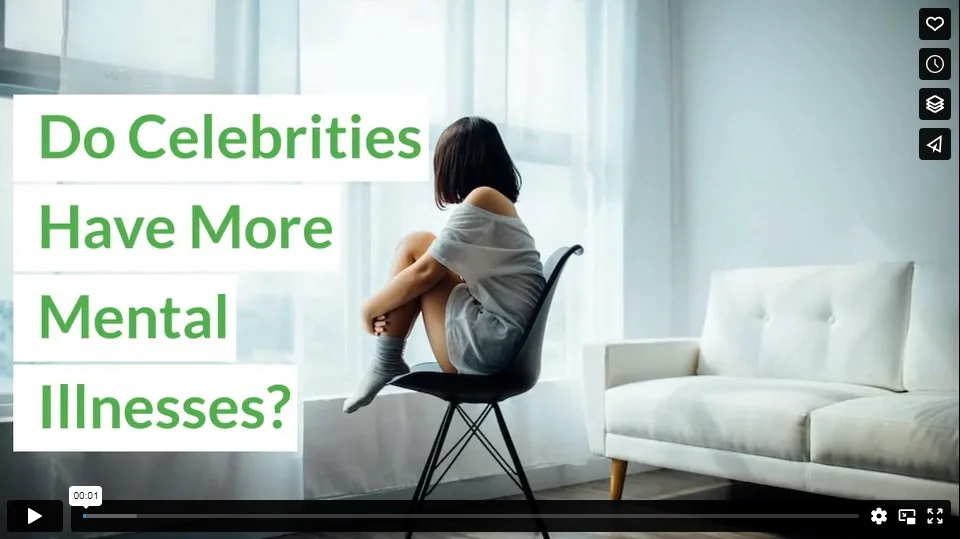An altered image of 19-year-old Chloë Grace Moretz went viral, likening her to a Family Guy character. Publicly making fun of her body caused the actress to pull back and isolate herself to work on overcoming the experience. Constance Wu from Crazy Rich Asians received so much backlash and online bullying from a tweet that she attempted suicide. And it’s not just female celebrities. Jonah Hill has repeatedly asked people not to comment on his body as it’s not helpful.
Furthermore, he will no longer participate in press interviews to protect his mental health and well-being. Naomi Osaka has become a mental wellness advocate in the sports world, taking breaks and refusing mandatory press interviews in the name of her mental health. These are just a few examples of mental health problems celebrities deal with daily.
Mental Illness Doesn’t Discriminate
Anxiety and depression are not preferential. According to the Centers for Disease Control and Prevention (CDC), over 50% of adults will be diagnosed with a mental illness. The spotlight’s glow can make celebrities more vulnerable and significantly impact their ability to overcome mental health challenges. The limelight can highlight the issue more for them than the rest of the population. Here are a few of the reasons their mental health can suffer:
Fame is Fickle
A celebrity can be beloved, but all it takes is one wrong tweet, a rogue family member supporting the wrong politician, or taking an acting gig in a movie that tanks, and their celebrity status plummets. Even if it’s through no fault of their own, it can make them question if it was something they did. They may link their self-worth to their celebrity ranking, making their confidence and well-being take a hit every time their status dips.
There’s a Shelf Life
Unless you’re Meryl Streep or Tom Cruise, there are few jobs for actors over a certain age. It stings when actors audition for jobs in their age range and younger stars repeatedly beat them for the role. There’s at least some protection against ageism in the workplace for the rest of us, but it’s standard in Hollywood. Being less in demand and pushed into an early retirement would make anyone feel less than and underappreciated. Celebrities are hustling as they know their time is limited.
Constant Pressure to be Perfect
In the age of Photoshop and filters, plastic surgery, botox, filler, cosmetic dental procedures, airbrushing, and micro blading, it’s no wonder we all struggle with our self-confidence. Celebrities must look perfect. Even if they already look incredible, magazines will edit their pictures within an inch of their life. Natalie Portman revealed that her most recent Marvel movie was the first that asked her to bulk up and look as strong as possible. Most films ask or demand her to look as slim as possible, like Black Swan. And if they don’t comply? They lose out on jobs or status slips, which they cannot always afford.
Their Private Life isn’t Private
Blake Lively, pregnant with her fourth child, opted to share a recent photo of her pregnancy bump to stop paparazzi from camping outside her house to snag the most recent photo of her pregnancy. Britney Spears had a mental health crisis, and photographers cashed in on her meltdown instead of getting her help. No matter where they turn, celebrities don’t get the luxury of a day off to handle their health problems privately. Every detail of their life is fair game and sold to the highest bidder.
Easy Access to Substances
Celebrities are exposed to more substances as it’s just part of the lifestyle. There’s more pressure to party and go clubbing than in other professions. Alcohol and drugs are readily available, even if they are underage. Early exposure, easy access, and other mental health issues can lead to substance use disorder and dependency. Stars like Michael Jackson, Whitney Houston, Heath Ledger, Amy Winehouse, and Prince are just a few celebrities who have died from accidental overdoses.
Celebrities Aren’t Immune
While celebrities may seem larger than life, the person behind their public, smiling face could be suffering. Just because there’s more awareness for celebrities with mental illnesses doesn’t mean they all get the help they need. Robin Williams, Kate Spade, Anthony Bourdain, and Avicii are a few of the celebrities that have died by suicide in recent years.
The CDC said that 3.2 million planned their suicide, 1.2 million attempted to carry out their plans, and 46,000 people died in 2020 alone. If you or a loved one are experiencing a mental health crisis or contemplating suicide, get help immediately before it’s too late.
There Are Alternative Depression Treatments
Celebrities may not want to take an antidepressant as they don’t mix well with alcohol or can cause drowsiness and weight gain. Now, newer and better therapies, such as transcranial magnetic stimulation or Accelerated TMS, have no systemic side effects and can treat mental illness quickly, so work life doesn’t have to suffer. Speak to your doctor about treatment options that can fit into your lifestyle.
Infographic
Fame amplifies mental health challenges for celebrities. Recent incidents with Chloë Grace Moretz, Constance Wu, Jonah Hill, and Naomi Osaka highlight public scrutiny’s toll. Ageism and body image pressures worsen their mental well-being. Privacy invasion by the paparazzi compounds their struggles. Substance access can lead to addiction. Shocking suicides remind us that celebrities aren’t immune to mental illness despite increased awareness. New treatments like TMS therapy offer hope for continued careers. Celebrities deserve compassion and mental health care, just like anyone else.

Video

